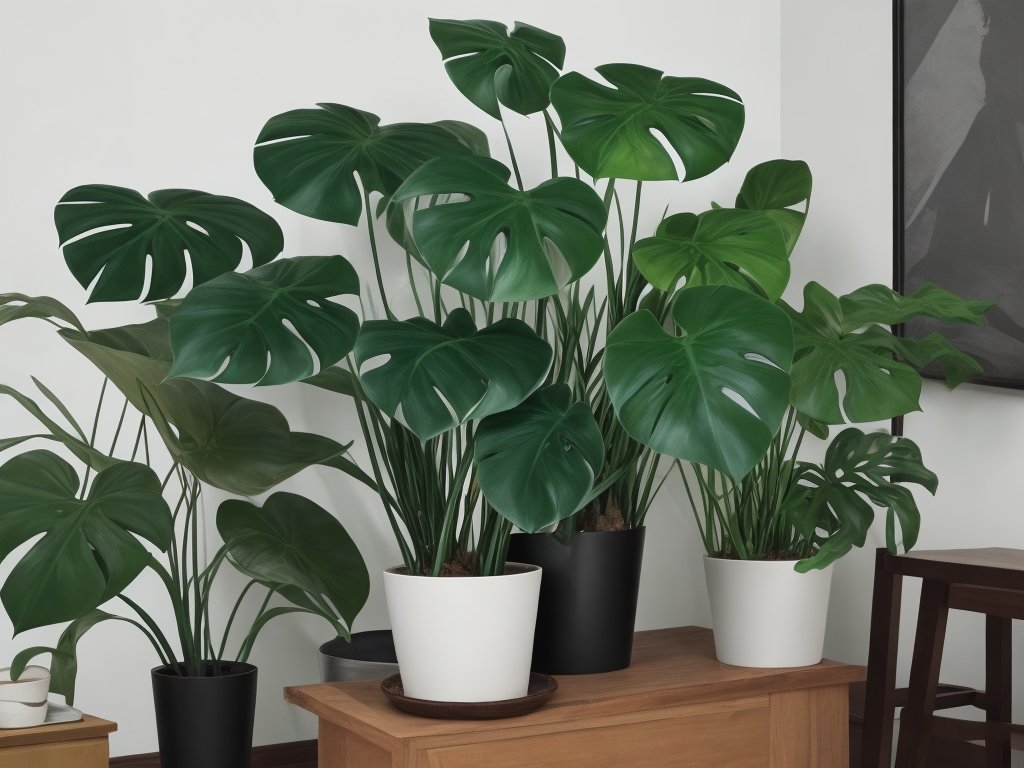Is Monstera Deliciosa Poisonous To Pets?
Key Takeaways:
- Monstera deliciosa (Swiss cheese plant) is toxic to pets, including dogs and cats.
- Consumption of Monstera deliciosa can cause gastrointestinal upset in pets, with symptoms such as vomiting and diarrhea.
- The calcium oxalate crystals in Monstera deliciosa can cause oral irritation in pets.
- Keep Monstera deliciosa plants out of reach of pets to prevent potential poisoning incidents.
Have you ever wondered if that beautiful Monstera deliciosa plant sitting in your living room could pose a threat to your furry companion? Well, you’re not alone.
As a pet owner, it’s only natural to be concerned about the safety of our beloved animals.
But don’t worry, I’m here to shed some light on the topic. In this article, we’ll explore the potential toxicity of Monstera deliciosa, commonly known as the Swiss cheese plant, and its effects on pets.
We’ll also discuss precautionary measures you can take to ensure the well-being of your four-legged friends.
So, stick around to learn more about this popular houseplant and how to keep your pets safe.
| Pet | Response |
|---|---|
| Dogs | No, but can cause vomiting or diarrhea if ingested |
| Cats | Yes, can cause vomiting, diarrhea, and difficulty swallowing |
| Birds | No, but can cause digestive upset if ingested |
Monstera Deliciosa: An Introduction
Monstera Deliciosa, also known as the Swiss cheese plant, is a popular houseplant known for its unique foliage and tropical appeal.
Overview of Monstera Deliciosa
Monstera Deliciosa, also known as the Swiss Cheese Plant, is a popular tropical vine that is native to the rainforests of Central America. It is well-known for its large, glossy green leaves that have distinct holes and splits, giving it a unique and attractive appearance.
Monstera Deliciosa is a relatively low-maintenance plant, making it a favorite choice for indoor gardening enthusiasts.
It can tolerate a variety of light conditions and is fairly forgiving when it comes to watering. With its stunning foliage and easy care requirements, it’s no wonder that Monstera Deliciosa has become such a beloved houseplant.
Monstera Deliciosa as a Popular Houseplant
Monstera Deliciosa is a popular houseplant for several reasons. Firstly, it has large, vibrant leaves that add a tropical touch to any indoor space.
Secondly, it is relatively low-maintenance, making it suitable for both beginner and experienced plant owners.
Lastly, it is known for its unique and striking fenestrations, which make it a visually appealing choice for plant enthusiasts.

Factors That Make Monstera Deliciosa Attractive to Pet Owners
Monstera Deliciosa is attractive to pet owners for a few reasons.
Its large, vibrant leaves make it visually appealing and add a touch of tropical charm to any space.
Additionally, it is relatively easy to care for, making it a popular choice for busy pet owners who want a low-maintenance plant.
Lastly, Monstera Deliciosa is known for its air-purifying properties, which can create a healthier environment for both pets and their owners.

Pet Safety Concerns with Monstera Deliciosa
Is Monstera deliciosa safe for pets?
Understanding the Chemical Composition
Understanding the chemical composition of Monstera Deliciosa is essential for assessing its potential toxicity to pets.
The plant contains insoluble calcium oxalate crystals, which, when ingested, can cause irritation and swelling in the mouth, throat, and digestive tract.
These crystals are the main reason for the plant’s toxic effects on animals.

Effects of Monstera Deliciosa Ingestion on Pets
Ingesting Monstera Deliciosa can have negative effects on pets. Some common symptoms include oral irritation, drooling, vomiting, and diarrhea.
In some cases, pets may experience more severe reactions such as difficulty breathing or allergic reactions.
It is important to seek immediate veterinary care if your pet ingests this plant.

Symptoms of Monstera Deliciosa Poisoning in Pets
Pets may exhibit symptoms such as oral and digestive issues, respiratory problems, and allergic reactions if they are poisoned by Monstera deliciosa.
Common Signs of Poisoning
Common signs of Monstera deliciosa poisoning in pets include vomiting, diarrhea, drooling, loss of appetite, lethargy, excessive thirst, and abdominal pain. They may also experience oral and digestive issues like irritation or swelling of the mouth and throat.
Respiratory and allergic reactions such as coughing, sneezing, difficulty breathing, and skin rashes may also occur.
If your pet exhibits any of these symptoms after ingesting Monstera deliciosa, seek immediate veterinary assistance.
Identifying Oral and Digestive Issues
Identifying oral and digestive issues in pets can be challenging, but some common signs to look out for include drooling, vomiting, diarrhea, loss of appetite, and abdominal pain. Keep an eye on your pet’s behavior and monitor any unusual symptoms.
If you notice any of these issues, it’s important to seek veterinary care as soon as possible.
Respiratory and Allergic Reactions to Watch Out for
Respiratory and allergic reactions that pet owners should watch out for include:
- Coughing and wheezing: Keep an eye out for persistent coughing or wheezing in your pet, as this could be a sign of respiratory distress.
- Difficulty breathing: If your pet is struggling to breathe or seems to be gasping for air, it’s important to seek immediate veterinary care.
- Sneezing and nasal discharge: Excessive sneezing or discharge from the nose may indicate an allergic reaction to Monstera deliciosa.
- Itchy, red, or swollen skin: Allergic reactions in pets can manifest as skin problems, such as itching, redness, or swelling. Pay attention to any changes in your pet’s skin.
- Watery eyes and runny nose: Like humans, pets may also experience watery eyes and a runny nose as a result of exposure to allergens like Monstera deliciosa.
Precautions and Safety Measures for Pet Owners
To ensure the safety of your pets, take these precautions when owning a Monstera deliciosa.
Keeping Monstera Deliciosa Out of Reach
To keep Monstera Deliciosa out of reach, place it in a location that is inaccessible to your pets. Consider placing it on high shelves, using hanging baskets, or placing it in a room that your pets do not have access to.
If necessary, use baby gates or barriers to create a designated pet-free space.
Remember, prevention is the best strategy to keep your pets safe.
Alternatives to Monstera Deliciosa for Pet-Friendly Homes
If you’re looking for pet-friendly alternatives to Monstera Deliciosa, here are a few options to consider:
- Boston Fern: This lush and leafy plant is non-toxic to pets and adds a touch of green to your home.
- Spider Plant: Known for its air-purifying qualities, the Spider Plant is safe for pets and easy to care for.
- Areca Palm: This tropical plant can bring a touch of paradise to your home and is safe for your furry friends.
- Peperomia: With their colorful and textured leaves, Peperomia plants are a pet-friendly choice that can thrive indoors.
- Money Tree: Not only is the Money Tree believed to bring good fortune, but it is also safe for pets.
Remember to always do your research before bringing any new plant into your home to ensure it is safe for your pets.
Training Pets to Avoid Houseplants
Training pets to avoid houseplants requires consistency, positive reinforcement, and patience. Here are a few methods you can try:
- Use deterrent sprays or natural repellents on your plants to make them less appealing to your pets.
- Create barriers or use baby gates to restrict access to certain areas of your home where plants are present.
- Teach the “leave it” or “off” command, rewarding your pet with treats or praise when they stay away from the plants.
- Provide plenty of toys, scratchers, and activities to redirect your pet’s attention and energy away from the plants.
- Consider using indoor plants that are safe for pets, such as spider plants or African violets, as alternatives to potentially toxic ones.
- Supervise your pet when they are near the plants and redirect their attention if they show any interest.
Remember, training takes time and consistency. With patience and positive reinforcement, you can help your pet understand that houseplants are off-limits.
Frequently Asked Questions
Can Monstera Deliciosa Cause Fatal Poisoning in Pets?
Yes, Monstera Deliciosa can cause fatal poisoning in pets. The plant contains calcium oxalate crystals, which can be toxic if ingested.
Pets may experience symptoms like oral irritation, vomiting, difficulty swallowing, and respiratory distress.
Prompt veterinary care is necessary if ingestion occurs.
How Long Does it Take for Symptoms to Appear?
Symptoms of Monstera Deliciosa poisoning in pets can occur within a few hours to a few days after ingestion.
Keep an eye out for signs like vomiting, diarrhea, drooling, abdominal pain, and respiratory distress.
If you notice any of these symptoms, contact a veterinarian immediately.
Are All Parts of the Monstera Deliciosa Plant Toxic?
Yes, all parts of the Monstera Deliciosa plant, including the leaves, stems, and roots, are toxic to pets. The plant contains chemicals that can cause gastrointestinal issues, oral irritation, and allergic reactions in animals.
It’s important to keep your pets away from this plant to ensure their safety.
Final Verdict
While Monstera Deliciosa is a beautiful and popular houseplant, it is important for pet owners to be aware of its potential toxicity to animals. The plant contains calcium oxalate crystals, which can cause various symptoms in pets if ingested.
It is crucial to keep Monstera Deliciosa out of reach of pets and consider pet-friendly alternatives for a safe home environment.
If your pet does ingest this plant, it is essential to seek immediate veterinary attention and provide emergency first aid if necessary. By taking proper precautions and educating ourselves, we can ensure the safety and well-being of our furry friends.







